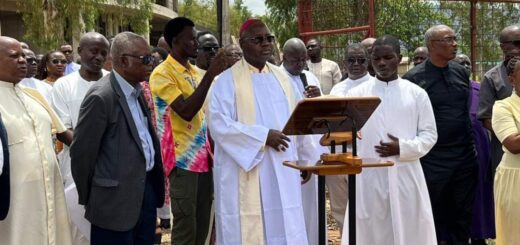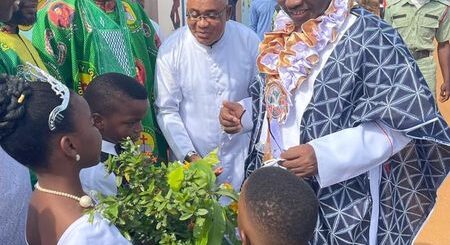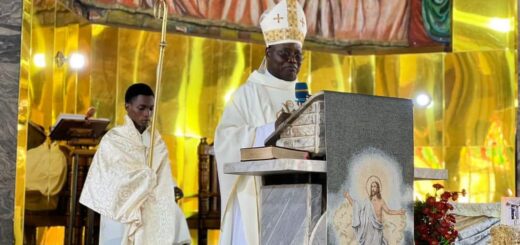Christian Participation in Political Life And The Call to Responsible Citizenship
by ARCH BISHOP · February 12, 2023
Catholic Bishops’ Conference of Nigeria, Opening Mass, 12th February, 2023. Homily by Most Rev. Ignatius A. Kaigama, Archbishop of Abuja.
Readings: Sirach 15:15-20; 1 Corinthians 2:6-10; Matthew 5:17-37
Christian Participation in Political Life And The Call to Responsible Citizenship
I join all the priests, the religious and the lay faithful of the Archdiocese of Abuja to warmly welcome you all as we begin the opening liturgy of the first plenary of the Catholic Bishops’ Conference of Nigeria taking place in a momentous time in the history of our nation.
It is always a blessing when Bishops “come aside” to reflect, cross-fertilize ideas and pray for not only the success of our pastoral and spiritual ministry, but also for the nation’s welfare, stability and progress. This plenary coming shortly before our national elections provides us a golden opportunity to pray together for peaceful, free and fair elections. I commend the patriotic spirit demonstrated by the Catholic Bishops, by bringing forward our statutory meeting from the first Sunday of Lent to now, in order to allow us to get back to be with our people as they engage in the sensitive and very important exercise of choosing new political leaders. We desire leaders that know the aches and pains of Nigerians; leaders who can transcend narrow religious and ethnic boundaries to work selflessly for the common good of all Nigerians; to lift Nigerians from the condition of strangulating poverty and frustration to better levels.
The theme of our conference, “Citizens’ participation in good governance in Nigeria” reflects the Bishops’ sensitivity to the great desire of the majority out there to shape the political future of this country; a country where as demonstrated in the murders in Owo, Katsina and Minna (where Fr. Isaac Achi, was burnt to death in the parish house) and many others, and now the scarcity and high cost of fuel and the newly invented scarcity of the Naira, have heightened a feeling of suspense and uncertainty. Before these daunting challenges, we face two risks: giving in to hopelessness and despair or to compromise our values and end up with leaders who were never intended by God nor elected by men.
The Liturgy of this Sunday is apt for a people living in our type of context, for it urges us to be aware of the kind of choices we make in life or even the choices we are about to make because these choices have serious implications for all of us. With our votes in the coming weeks, we can either choose a reasonable and productive use of power towards unity, security, a good economy or just abandon our fate in the hands of people who have neither capacity nor conscience.
The first reading from Ecclesiasticus says God “has set fire and water before you; put out your hand to whichever you prefer…before you are life and death, whichever you choose shall be given you” (Sir. 15:15-17). Are we simply, out of sentiments going to make choices that would diminish or ignore our own good and the good of others and of our country?
In the second reading, Paul dismisses the human wisdom that excludes God and advises us to depend on the inspiration of the Holy Spirit who “reaches the depths of everything, even the depths of God” (1 Cor. 2:10).
In the gospel, Jesusoffers us some high moral ideals that can provide a useful orientation to our choices and decisions. By bringing out the inner meanings of the commandments regarding murder, adultery and false oaths, He calls us to obedience to the Law, and if we are worthy of the name “children of God,” we must allow God’s word of truth penetrate our minds and hearts to form our consciences.
The Jewish teachers and lawyers studied the law with great care but too often they focused solely on rules and missed the point. Jesus the Great Teacher urges us to be more righteous than the Pharisees and teachers of the Law, not just by merely obeying a set of rules, but by avoiding negative actions such as murder, uncharitable remarks, insults, anger, lust, adultery, divorce, etc. He prescribes love of enemies, generosity and dialogue rather than retaliation, for a society to make great progress.
The recent visit of Pope Francis to Africa (the Democratic Republic of Congo and South Sudan) should inspire us bishops, priests and Catholics to remain resolute in speaking out against social injustices. As the Holy Father remarked, religious leaders “cannot remain neutral before the pain caused by acts of injustice”. We Bishops have been unambiguous in condemning the abuse of power and plundering of our rich human and natural resources. While the Church remains non-partisan as Pope Francis teaches in Evangelii Gaudium no. 183, she “cannot and must not remain on the sidelines in the fight for justice.”
Our nation prides its motto as “unity and faith, peace and progress”, but we are so divided by selfish religious and ethnic interests that gravely undermine our unity.
Corruption rears its head even in the most unlikely quarters. I recently asked a young man of his age which may affect his chances in a recruitment exercise which demands that he should be under thirty years, and he simply laughed and said casually, “one can reduce his age nowadays.” It is very sad that people are forced to bribe in almost everything, such as to win a contract, to get justice, to get budgets approved, etc.
In a country where the youth, the hope of our nation are left unemployed, and where according to OXFAM, three persons in Nigeria have wealth more than 83 million other Nigerians’ resources put together, are we surprised that youths jet out (japa) to foreign countries from their motherland where the cost of governance is so high and corruption so pervasive that a huge chunk of what is due to them is swallowed up?
Our work as priests today is made more difficult by the administrators of Nigeria’s resources as many helpless people finding it hard to reach those in political authority believe that the Church can provide the material help they need. Meanwhile, many don’t know that even though the Church has been a voice of the voiceless, offering educational, medical and other social services for decades, she receives no grants from the Federal Government as is done elsewhere.
To ignore the poor is a grievous social sin. St. John Chrysostom aptly says that “when we attend to the needs of those in want, we give them what is theirs, not ours. More than performing works of mercy, we are paying a debt of justice” (CCC 2446).
As we pray for free, fair and credible elections, the politicians and all of us must avoid offensive statements uttered just to humiliate, to look down on others and wound their dignity; words of rejection, resentment, hate or revenge.
We must avoid the Esau-syndrome, who mortgaged his birthright over a plate of pottage (cf. Gen. 25:29-33). We must also shun the way of Judas Iscariot, who sold his Master for the price of a slave (cf. Mt. 26:15) and make well informed electoral choices; not to be given to selfish sentiments and political manipulations as the crowds who chose the criminal Barabbas to be released and rather have Jesus crucified (cf. Mt. 27:17-22).
We pray God to bless us with political leaders of integrity and the fear of God. The next president needs a great measure of God’s grace as he swears an oath on May 29th, 2023, knowing that Nigeria is not poor, but it has poverty of management.
May the Holy Spirit inspire solutions to the multidimensional problems bedeviling our nation. Let us entrust our affairs to Mary, our Queen, Mother and Patroness. All will be well with us and our dear country. In the name of the Father and of the Son and of the Holy Spirit.




